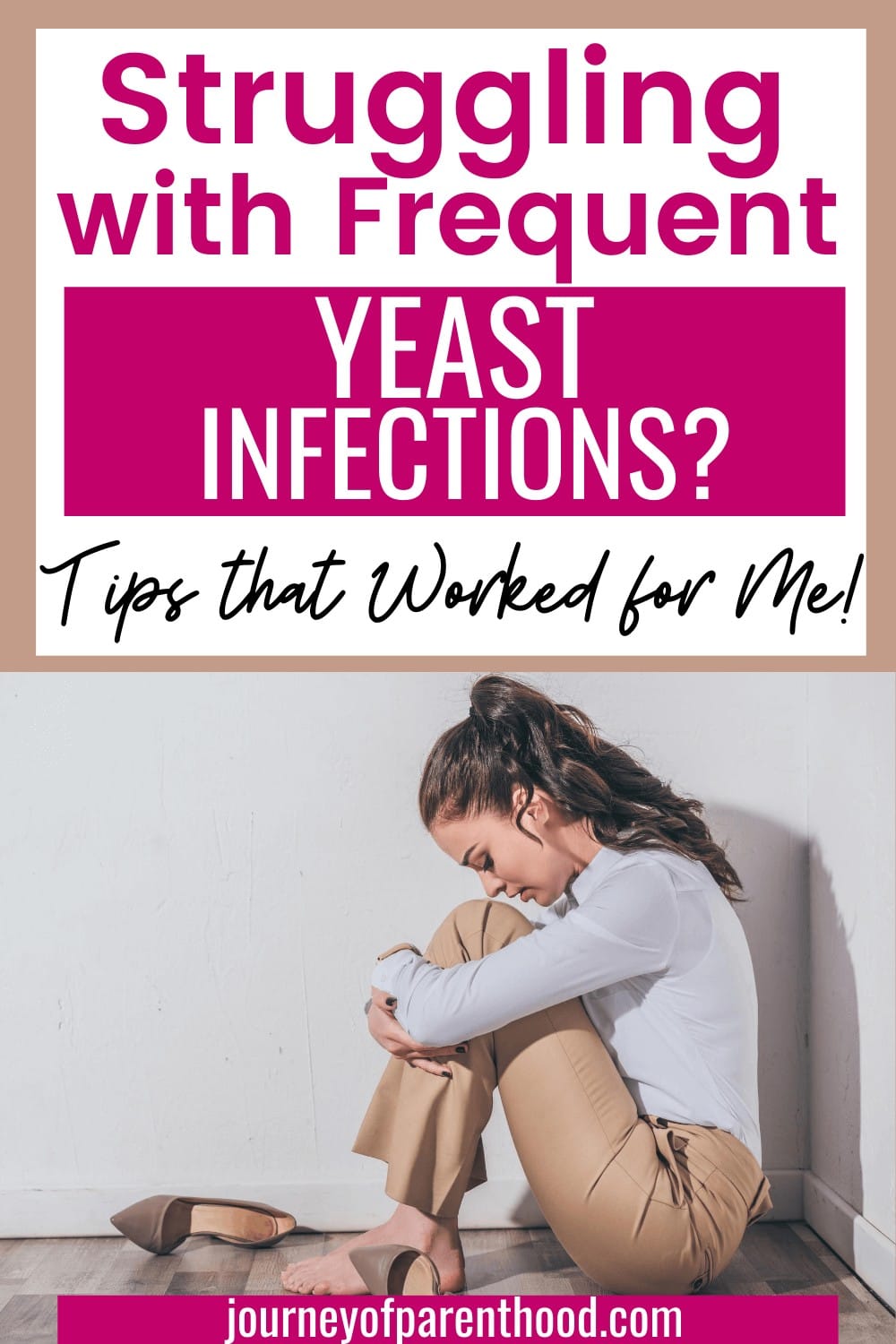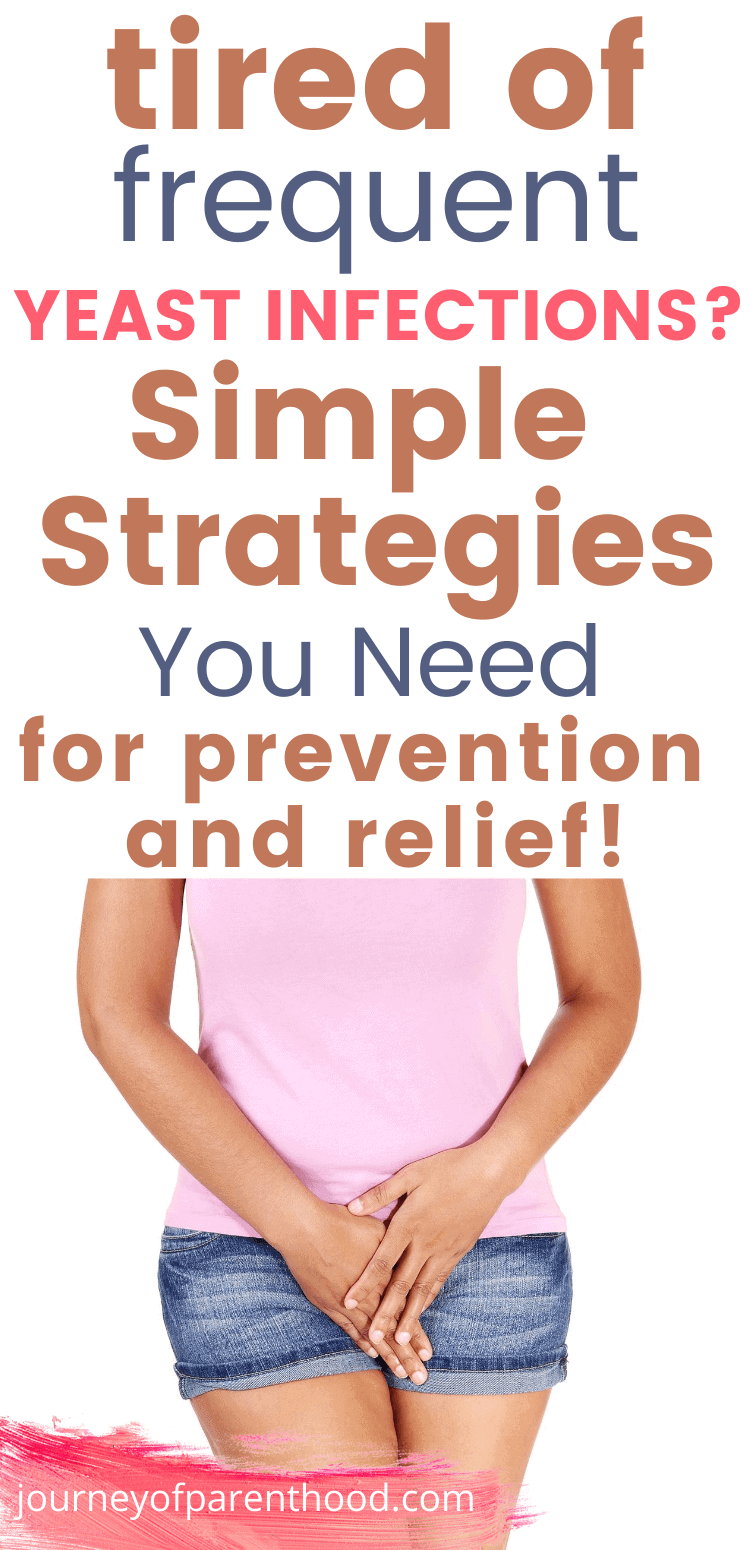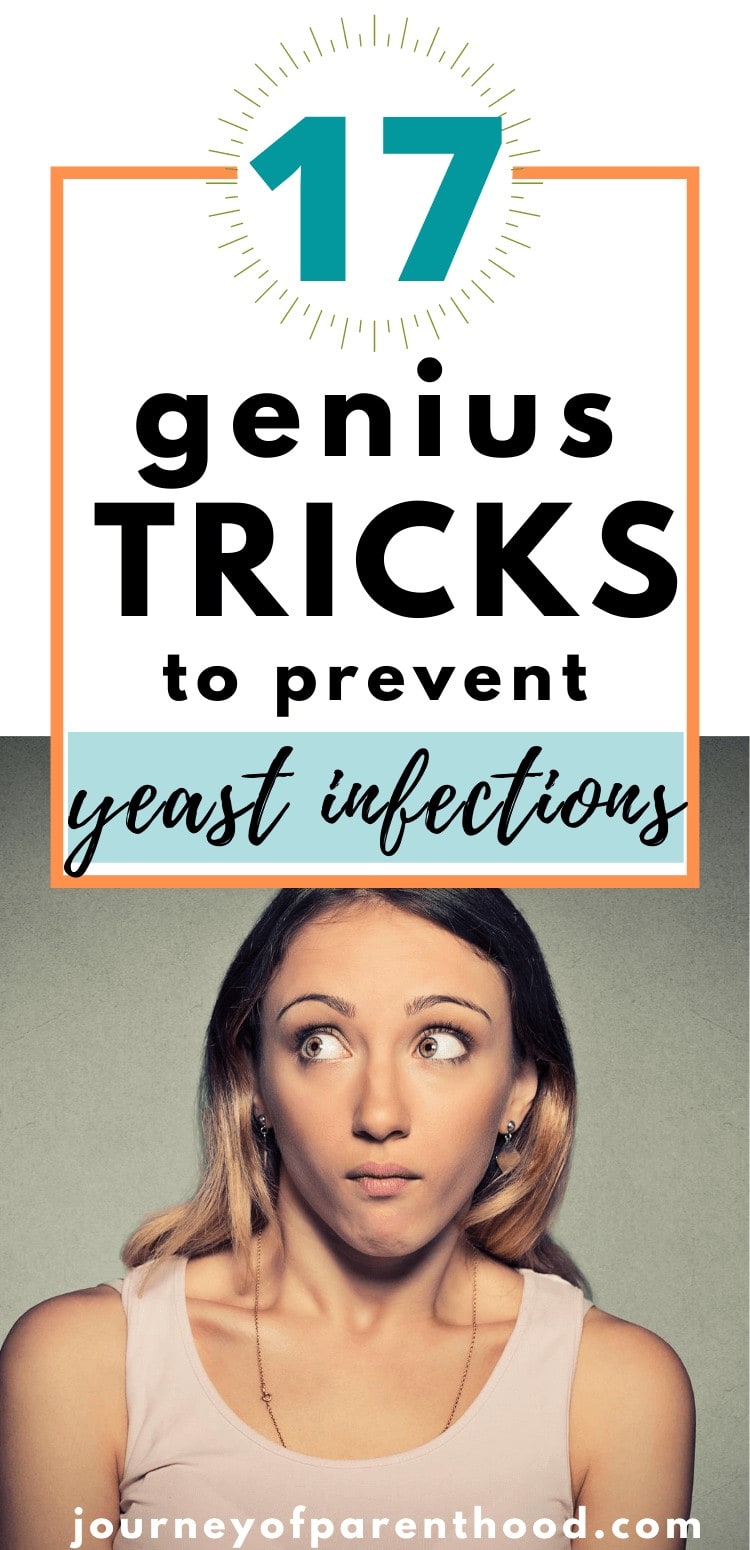Today I’m sharing my personal experience learning how to prevent recurring yeast infections! Fun, right?
I cannot believe I’m writing this post. BUT I shared on Instagram recently about my issues over the last SEVERAL years with suffering chronic yeast infections and SO MANY people sent me messages saying they appreciated hearing they weren’t the only ones with this miserable struggle and a large majority of my followers voted “yes” to wanting to hear more tips. So. Here I am! Truly living up to my “oversharing and owning it” tagline, ha!
Let me also add…my husband voted a strong “NO” in regards to writing this post so I’m going to write it as delicate as possible to avoid any marital issues 😉
Obviously… I AM NOT A DOCTOR. I’m just a regular mom in my mid-30s. No medical background. No science knowledge. No title that gives me the expertise to provide medical advice. Just a regular person who got frustrated with googling how to prevent yeast infections and only getting long medical sites that didn’t have all that much truly helpful info!
If you have ANY bodily concerns, consult your doctor. I’m in no way trying to provide medical advice here and am not claiming to be any sort of expert (although I’ve had enough of my life revolve around my vagina to feel like I miggggght be somewhat of an expert).

Disclaimer: this post contains affiliate links.
Knowing You Have a Yeast Infection
From Mayo Clinic: “A vaginal yeast infection is a fungal infection that causes irritation, discharge and intense itchiness of the vagina and the vulva — the tissues at the vaginal opening. Also called vaginal candidiasis, vaginal yeast infection affects up to 3 out of 4 women at some point in their lifetimes.”
It’s also NOT a sexually transmitted disease and is not the same thing as the yeast infections babies get in their mouths referred to as thrush (Although fun fact, I did deal with that a lot too while nursing so I feel like maybe it CAN be related? You can read my tips on battling thrush here)
It is also common for women who have never experienced a yeast infection to start having them during pregnancy as well as for women who struggle with frequent yeast infections to stop having them during pregnancy too.
With having frequent yeast infections, I’m able to know I have one before I even really show many symptoms. I can just TELL.
But if you’re wondering how to know whether or not what you’re experiencing is in fact a yeast infection here are the yeast infection symptoms:
- Itching
- Burning when urinating or during intimacy
- Vaginal Discharge (often thick or white but not always!)
- Pain or soreness
- Redness or rash (honestly I avoid looking down there so I can’t attest to these symptoms)
If it’s your first yeast infection you truly may not know you have one until it gets pretty bad. Once you’ve had the experience you can better recognize the symptoms and avoid a lot of the worst ones by catching it early.
Treatment for Yeast Infections
It may seem like a post like this should start with the prevention rather than the cure. But there is really no real reason TO prevent yeast infections if you don’t get them.
You don’t really know that you need to be taking preventative measures until you have experience a yeast infection.
I find that most women I know either have yeast infections or urinary tract infections. Those I know that get frequent UTI’s don’t seem to get yeast infections, and I personally fall into the yeast category and have never had a UTI. I can’t say which is worse to deal with – I’m sure they both equally suck.
For your first yeast infection – call your doctor. After that initial one though I tend to just have my husband stop by the pharmacy on the way home from work and grab a Monistat (or off brand works too) for me to use.
You can have your doctor prescribe Diflucan but I tend to not to want to go through the hassle of getting in touch with my doctor or having them want me to come in before prescribing the Diflucan so I typically go the Monistat or terconazole (or whatever storebrand they have on the shelf that is cheapest).
It can be confusing on which over the counter option to purchase. There are creams. There are suppositories. There are ointments and tablets. There are 1 day treatments. There are 7 day treatments.
I’ve used them ALL. And my personal preference is the Monistat 3 Day. I like either the prefilled cream or the suppositories. I personally always catch mine early enough where I never even need the itch cream, but I have heard it can be used to help prevent bags under your eyes so I need to stop throwing it away!
I prefer the 3 day over the 1 day or the 7 day. Yes it’s gross using the medicine and it’d be awesome to do it for one day and be done…but I’ve found that the one day just doesn’t work very well. I usually don’t have full relief and recovery from just a one dose medication.
I choose the three day over the seven day because seven days of that icky feeling is MISERY and the three day seems to work just as effectively as the seven day. However, IF I am really struggling and have worse symptoms or don’t catch it early enough, I will get the Monistat 7.
Here are some things to remember during the treatment of your yeast infection:
- Use the medicine at NIGHT, right before going to bed. Literally be 100% ready for bed so you can lay down right after inserting the medication.
- Do not be intimate for a full week to ensure you don’t give it to your husband (YES it can happen) and to not make it worse for yourself.
- Have panty liners on hand to wear the days following the Monistat doses.

How to Prevent Yeast Infections
Prevention is key when it comes to dealing with dreaded vaginal yeast infections. I have spent years (as well as countless OBGYN visits) trying to figure out how to best stop my body from being stuck in a chronic yeast cycle.
Here are all the tips I’ve learned to help prevent yeast infections from occuring:
Wear 100% Cotton Underwear
It is important to only wear underwear that is made of 100% cotton. Not just the ones that have a cotton liner, but underwear that is fully cotton!
Cotton is a breathable material that will help prevent yeast from forming. Any other materials will trap moisture.
Quickly Change Out of Swimwear
Naturally, bathing suits aren’t made out of cotton. Not only is the material of a swimsuit problematic but you’re usually sweating and swimming in water with chemicals or sand or other things that can cause your pH balance to be thrown off. It’s important not to sit around in a wet bathing suit for longer than necessary.
We go to the beach every summer for a week and it’s a guarantee that I’ll have an awful yeast infection by the end of our trip every single year. This last year was my first time NOT getting one and I think it’s because I not only changed out of my swimsuit as quickly as possible, but I also bathed off after coming up from the beach. Not just a quick rinse of my feet, I got in the shower and washed my girly parts and I think that really made the difference!
Bathe With Simple Bar Soap to Avoid Discomfort
No fancy body wash. No smell good soaps. Keep your shower routine simple. Even with using bar soap, you have to be careful of which one you buy.
Either the super basic Dial bar soap OR the super basic Dove bar soap are fine!
Prevent Yeast Infections by Always Using a Fresh Towel
Maybe this is an obvious to lots of people but in my family we tend to reuse a towel a couple times before washing. Not anymore!
I am religious about this and always use a new, clean towel every time I bathe in order to make sure to keep everything fresh! If I’m staying somewhere that a fresh towel isn’t available, I will use a wash cloth or hand towel or something to dry my private area and then use the bath towel to dry everywhere else.
It’s also important to dry that area before others. My routine is dry my face first, then lady parts, then the rest of my body. Get in a routine doing it and it will just become second nature!

Wipe and Dry Front to Back
A huge, huge important thing to remember is to ALWAYS do EVERYTHING from front to back. Wipe front to back. Dry your body from front to back. Even bathing – wash front to back.
Anything that touches the back should never touch the front. Period. Once it’s touched the back it needs to be cleaned before touching the front.
This is a really crucial thing to teach younger girls too when they start wiping on their own or drying themselves off after bathing.
Avoid Bubble Baths to Prevent Yeast Infections
Baths in general aren’t the best if you have a sensitive female area. Sitting in warm water just isn’t an ideal situation. But bubble baths? Big no-no.
I was actually very sensitive even as a child and had to avoid bubble baths even then. My daughters were really excited about the bath bomb trend but we quickly realized they, too, are more sensitive so we do not use bath bombs or bubble bath in our home.
On the occasions that we do use a bath bomb or allow them to take a bubble bath we always also shower off after to make sure the fragrances and other ingredients don’t cause an issue.
If you have a child who experiences some sensitivity the best product to use is simple A&D Ointment. Apply before bed and have them sleep without underwear for the night!
Avoid Anything Scented
Lotions. Creams. Body Washes. Anything with a scent doesn’t need to go anywhere near your lady parts – ever. Keep it simple!
For myself, I have always used Cocoa Butter Lotion as it’s very basic. Obviously I’m not applying lotion to my private area, but I have found that heavily perfumed lotions (I’m looking at you, Bath and Body Works) in general tend to cause issues for me so I avoid them.
Take a Daily Probiotic, or Two!
Probiotics are proven to help prevent yeast infections and taking a daily probiotic is a great way to help ensure you keep them at bay (plus probiotics have tons of other benefits too!). Supposedly it’s the ingredient lactobacillus acidophilus that really helps!
Yogurt is also a good source of probiotic and when I was really struggling with the chronic yeast I’d eat yogurt every single day. I also try to make sure my kids eat yogurt a few times a week so they will enjoy it more!
If I feel symptoms coming on that seem like I may be getting a yeast infection or I’ve been in a situation where I know I’m more likely to get one (like the beach trip) then I will double up on my probiotic intake to help too.
I take Probiotic Restore Ultra every single day!
I also am hardcore about giving my kids a daily probiotic. Tess (my third child) loves the flavor of the Probiotic Fast Melt and I also mix a packet into my youngest child’s (Spear) yogurt or applesauce every day.
Kye and Britt (my two older children) prefer the flavor of the Young Living Kidscents Mighty Pro so they have that each morning. Probiotics are often discussed with other health topics as they are great for gut health and help build a strong immune system too.
Avoid Antibiotics
Avoid taking antibiotics if at all possible. When I was struggling with repetitive yeast infections I did all I could to completely avoid antibiotics.
Antibiotics can cause yeast issues, especially if you are already prone to yeast infections. So trying to limit the use of taking prescription medications can help in prevention!
Shower After Intimacy
This one is a pain and annoying but it’s a must-do for me. No real details needed here, just be in a routine of showering or at minimum bathing off after being intimate.
It is also important not to BE intimate if you have symptoms of a yeast infection! It will only make things worse and it is possible to pass it to your husband and then be stuck in a cycle of passing it back and forth.
Ways to Prevent Yeast Infections: Avoid Douching
Real talk? I don’t even know what douching is, I only know the term douche as a way to describe guys similar to Scott Disck 😉
A big reason I’m sitting here writing this post is because of the “avoid douching” recommendation on like every single website I could EVER find when trying to get help for my chronic yeast infections. That isn’t helpful advice! I wanted REAL tips that would REALLY help and I hope this post is providing helpful tips for someone else…but since clearly every single website warns you not to douche then I also probably should give that warning too just in case!
Avoid Pads During Period
I know many people love a cup for their periods but I just can’t go there. I am careful to avoid wearing pads and to stick to tampons as much as possible during my cycle.
I have also had people tell me that it’d be best to switch to a natural organic tampon as well as organic pads which makes SO much sense. I am planning to change tampons once I’m out of the regular ones I use.
Using cotton pads and cotton tampons is just like wearing the cotton panties! Of course it would make a difference so I’m eager to try this tip for sure.

The Birth Control Decision
Some people find that using birth control helps to limit the frequency of their yeast infections. Others find that the hormones in the birth control cause yeast infections to become more frequent.
I worked with my OB to figure out the best fit for me. We tried just taking birth control as it’s prescribed and my body didn’t do well with that at all.
Then we tried skipping my monthly cycle by taking the week 1 birth control pills when I should have been having my period. THIS worked beautifully.
By skipping my periods my hormones were more leveled as was my vaginal pH balance and it really helped minimize my yeast infection frequency.
However, I personally just don’t love taking birth control and since my husband has had a vasectomy I didn’t really NEED to be on it.
My next decision with my OB was to just come completely off of birth control all together. See how my body responds and decide what to do from there. A next option may be to have an ablation as ablations typically stop the monthly periods which would be the same thing as when I was taking birth control to skip my period each month but with a long term solution that doesn’t involve taking a daily pill or having those hormones in my body.
Birth control is a VERY personal decision but it IS one that may impact your body’s proneness to yeast infections so it’s worth exploring with your obstetrician. I have had many people also tell me that having an IUD has made a big difference so that may be a great option to discuss as well!
Boric Acid Suppositories Can Help Prevent Yeast Infections
Another discussion to have with your obstetrician is whether or not having some boric acid suppositories on hand would be beneficial for you. My OB and I worked out a routine where I inserted a boric acid suppository each night before bed for a certain amount of time to help balance my pH levels.
During that time I also would use the suppositories after having sex. It was just part of my routine for a while.
Now that things are better and my yeast infections are less frequent I am able to just have the boric acid suppositories on hand for times when I feel symptomatic as they help to knock out the symptoms and prevent them from worsening. It’s also helpful to have on hand during times where I’m participating in higher risk activities that may be more likely to cause an unbalance in my pH levels (like going to the beach).
Not every pharmacy can make the suppositories so your OB can direct you as far as how to obtain them by they make a huge difference and are a great tool to use to help break that cycle!
Additional Ways to Prevent Yeast Infections
I had several people message me on Instagram and share some of their tips on ways to prevent yeast infections. These are things I have not yet personally tried but I still wanted to share them as they may be helpful!
Diflucan Routine
Apparently an option to also discuss with your OB or health center is to have a refillable Diflucan prescription on hand in order to take it once a week for a time period decided with your doctor.
Coconut Oil
Another great tip I had a friend share with me is to keep coconut oil on hand and apply it to your genital area at first symptom of an upcoming yeast infection.
It will help lessen symptoms but also clear it up! If you’re struggling with frequent yeast infections it can’t hurt to try and is a great healthy option.
The Candida Diet
In doing research for this post I discovered something called The Candida Diet which is a way to eat healthier and help eliminate sugars that feed into the growth of candida (which is what yeast infections essentially are).
You can learn more about this diet plan here! For sure worth exploring if you’re struggling with frequent yeast infections.
My Personal Experience
Obviously I’ve shared a lot of my personal experience throughout this post. I have struggled with female related issues for as long as I can remember, it’s just been part of being me.
I have come to realize that my natural body has a very delicate pH balance. If the slightest thing throws it off, I have issues. In addition to the yeast infections, I also am very prone to bacterial vaginosis which is simply when the natural balance of bacteria gets thrown off.
It is all BEYOND frustrating for many, many reasons, and is something I’ve cried literal tears over on more than one occasion.
I’m hopeful that my experience can help others who may be struggling with similar issues to have some relief. Hopefully, all of my ways to prevent yeast infections will help someone else conquer their struggle too!
I also am hoping I can help my daughters avoid my same fate by starting early with probiotics and avoiding bubble baths and such too. Their health is important to me and I just want them to avoid my same struggles if possible!
The combination of all of the things I’ve discussed in this post has greatly reduced the frequency of yeast infections I battle. I am SO thankful! I have an incredible midwife who has been so great at helping to solve this puzzle that is my female anatomy.
I am currently debating whether or not to have an ablation. I’ve been allowing my body time to get all of the birth control out of my system and adjust to not using it and have been monitoring my cycles and symptoms and any issues that pop up in order to decide the best path moving forward!
- A Letter to my Son on His 16th Birthday From Mom (Kye’s Bday Letter) - March 20, 2025
- Open Letter to my Daughter on her 12th Birthday – Love, Mom {Britt’s 12th Bday Letter} - January 16, 2025
- Letter to My Son on his 6th Birthday – Love Mom - January 8, 2025







I am also considering an ablation. A few women in my family have had them and the only thing stopping me is the recovery time. I would be doing it because of heavy heavy flow and my dr thinking I will be menstruating for at least another 15 years (just turned 36.) My deductible was met in January so if I’m gong to do it this is the year!
Author
The people I know who’ve had the ablation say recovery time is a BREEZE!!! Hysterectomy is supposedly tough but the ablation is only one day down time!
Very helpful just to know others understand. Thank you for sharing!
I am struggling with this too right now😩 hope youve gotten some relief!
I’m struggling with yeast infection and I have been going to the doctor. She even put me on chronic for 6 months and it doesn’t go away. Some months are good and others are just bad